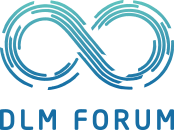DLM Forum 2022 webinars
DLM Forum's upcoming and past webinars for 2022 (click to scroll)
January 26th - "Using DNA Technology to Store Digital Information"
February 16th - “Digitally archiving court judgments”
March 23rd - “Supervision and collection of digital documentary heritage in Latvia”
April 20th - “Harvesting data from Twitter”
November 29th - “Metadata: The Dutch standard, its use and international comparison”
Webinars are open to DLM Forum community members.
"Using DNA Technology to Store Digital Information" by Eurecom, 26th January at 14 (CET).
Webinar introduction: The growing adoption of AI and data analytics in various has resulted in digital preservation emerging as a cross-sectoral problem that affects everyone from data-driven enterprises to memory institutions alike. Historically, fundamental limitations in the density and durability of magnetic storage media has necessitated an active, migration-based approach towards digital preservation. However, as the amount of data stored continues to increase exponentially, such an approach is quickly becoming infeasible due to an associated increase in the cost of data migration.
In European Union-funded Future and Emerging Technologies project OligoArchive, we are exploring an unconventional storage media that can enable truly passive preservation--synthetic Deoxyribo Nucleic Acid (DNA). In this talk, I will highlight the opportunities and challenges in using DNA as a digital storage medium. In doing so, I provide an overview of the ongoing collaboration between project OligoArchive and the Danish National Archive in preserving culturally important digital data with synthetic DNA.
About the speaker: Raja Appuswamy is an Assistant Professor in the Data Science department at EURECOM--a Grandes Écoles located in the sunny Sophia Antipolis tech-valley of southern France, where he leads the EU Future and Emerging Technologies initiative OligoArchive that focuses on using DNA as both storage and computational media. He received his Ph.D in Computer Science from the Vrije Universiteit, Amsterdam. He also holds dual Masters degrees in Computer Science and Agricultural Engineering from the University of Florida, Gainesville.
Registration for the webinar is CLOSED. Back to top
“Digitally archiving court judgments” by John Sheridan, The National Archives, 16th February at 14 (CET).
Trailer:
Registration for the webinar is CLOSED. Video presentation now available. Back to top
"Supervision and collection of digital documentary heritage in Latvia" by Gatis Karlsons, Deputy Director of the National Archives of Latvia, 23 March 14-15 (CET).
Webinar introduction: This webinar is going to provide an insight into the supervision and collection of digital documentary heritage in Latvia. The National Archives of Latvia is supervising about 4000 institutions. Each of them is obliged by archives law to submit their electronic records to the National Archives within 5 years of their creation. This includes "regular" e-signed records, sound, image and audiovisual records as well as databases. This, of course, doesn't work so well as written in the law. Gatis Karlsons will explain the reasons why everything doesn't go so well and highlight possible solutions.
Trailer:
Registration for the webinar is CLOSED. Video presentation now available. Back to top
“Harvesting data from Twitter” by Martin Rechtorik, The National Archives of the Czech Republic, 20th April at 14-15 (CET).
Trailer:
Registration for the webinar is CLOSED. Video presentation now available. Back to top
"Interconnecting the information Lifecycle. How the Swiss Federal Archives closed the entire information lifecycle of the Swiss Federal Administration - from records management to online access of protected metadata" by Stefan Kwasnitza, SFA, 29 June at 14 (CET).
Webinar introduction: In 2021, the Swiss Federal Archives were able to close not only the archival, but also the entire information life cycle of the Swiss Federal Administration. With the interconnection of records management, digital archives and online access, the authorities can retrieve directly and sustainably all their information online. Due to the “Online Access to the Federal Archives” users can now fully access archival records online: they can search in primary as well as metadata, get help via chat or chatbox, view and download documents. Furthermore, users can submit requests to consult records in case access is restricted, and after having received authorization, directly access these records online by dint of a complex user rights management. Simultaneously with the Online Access, the SFA launched a new in-house infrastructure for the on-demand digitization. Users can order analogue records that are not only digitized but also stored and preserved in the digital repository. All future users can access these documents permanently. To cut a long story short: With the go-live of the online access, the SFA have completed the digital life cycle of archived documents.
Registration for the webinar is CLOSED. Video presentation now available. Back to top
"Metadata: The Dutch standard, its use and international comparison" by Vincent Hoolt, Corinne Boeijinga-Hubers, Wout van der Reijden and Geert Loloup, National Archives of the Netherlands, 29 November 2022 at 14-15 (CET).
Webinar introduction: For years, the Netherlands had two metadata schemes. One for local governments and one for the central government. They were similar, but with some key differences. Furthermore, the quality of the metadata captured varied immensely. Adding to these issues, both schemes were still very much based on a “paper” reality for electronic records, e.g. all records will be in file, files in series and so on. This is not the reality on the ground, where information comes in all forms and sizes and is organised in multiple ways.
So, the order for the National Archives was clear: Develop a new metadata scheme for transferring sustainable accessible information objects between systems. This must take the current issues into account and resolve them. Furthermore, it should include guidance on the actual transfer.
So that’s what we did. However, we didn’t stop there. We’ve also looked closely at fostering adoption and implementation of the standard.
In this webinar, we’ll describe how we’ve developed a standard that is fit for a new age (we hope) and how you can work on the adoption of the standard. Of course, we’re not forgetting international developments and their relation with our standard and guidance on SIP creation and more.
Trailer:
Registration for the webinar is CLOSED. Video presentation now available. Back to top
"Handwritten Text Recognition at the National Archives of Estonia – our Experiences with Transkribus" by Sven Lepa, National Archives of Estonia, 8 December 2022 at 14-15 (CET).
Webinar introduction: AI-powered handwritten text recognition for historical documents has gained more traction over the last few years, with Transkribus being one of the central providers. The National Archives of Estonia started their first experiments with Transkribus in 2018. In October 2022, we made three diverse automatically transcribed collections public: Petitions to the Governor-General of the Estonian Governorate (1630–1707), Minutes of Tartu City Council (1902–1940), and Birth Registries of Russian-Orthodox congregations (1838–1926). The talk will give an overview of our experiences with HTR and Transkribus.
Sven Lepa is the vice-head of the access and enquiry department of the National Archives of Estonia, working on different ways to raise the usability of digitized sources from crowdsourcing to text recognition. He is the project lead of the archives’ Transkribus project.
Trailer:
Registration for the webinar is CLOSED. Video presentation now available. Back to top





